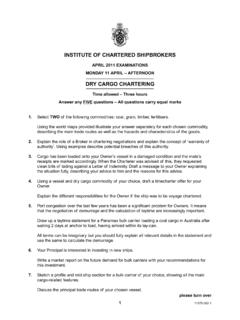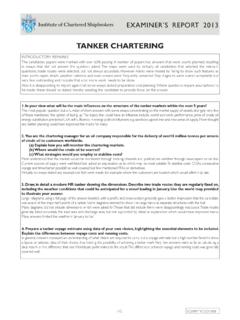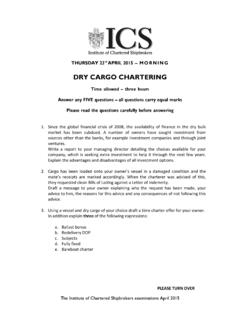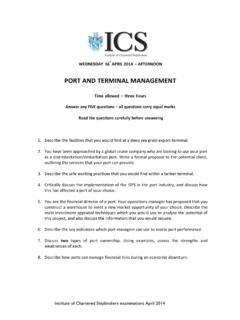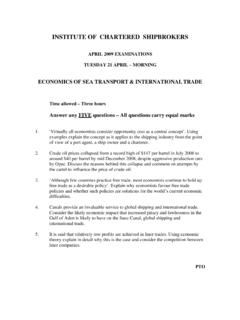Transcription of 2014 ICS Examiner’s Report MARINE INSURANCE (MI)
1 General comments Question 1 was the most popular this yearfollowed by question 4; the least popular one was question 7. Question 1 This question was the most popular question. Here, the candidates were expected to be familiar with an insurable interest in shipping practice and MARINE INSURANCE laws; also to be familiar with the relevant provisions of the MARINE INSURANCE Act 1906. The candidates were to carry out a detailed discussion on insurable interest and what this entails. The answer was also to include a clear discussion on every aspect of the application of this principle and how it determines a right to insure a risk. Those who fared above-average had presented a good answer, using case laws in their discussions to demonstrate a good understanding of the law.
2 The performance of the candidates on this question could be summarised as being good. Question 2 This was the second least-popular of the questions answered. The candidates were expected to be familiar with a) perils of the sea b) the measure of indemnity for damage to an insured vessel under the MI Act 1906. The candidates were to carry out a detailed discussion of both part a) and b) of the question. Candidates were expected to be fully acquainted with the perils of the sea and demonstrate a good understanding of how the measure of indemnity is calculated with differing levels of damage. The performance of the candidates on this question could be summarised as being above average.
3 2014 ICS Examiner s Report MARINE INSURANCE (MI) Question 3 The candidates were expected to be familiar with proximate cause and indemnity in MARINE INSURANCE . The candidates were expected to carry out a detailed discussion on the doctrine of proximate cause in determining claims arising under a MARINE INSURANCE policy under (1) of the MI Act 1906. Also how a MARINE INSURANCE policy is a contract of indemnity. The answer was to include a clear discussion on the common law principles of proximate cause, while determining the actual cause of the loss arising under a MARINE INSURANCE policy. The performance of the candidates on this question could be summarised as being good. Question 4 This was the second most popular question.
4 Here, the candidates were expected to be familiar with warranties in a MARINE INSURANCE contract and the technical defence it offers. The candidates were to carry out a detailed discussion on warranties under a MARINE INSURANCE contract, and how it is a condition precedent and promissory in nature. Students were expected to discuss this technical defence that the insurers have in their arsenal while defending any claims, and the consequences of breach of warranty. The performance of the candidates on this question could be summarised as being good. Question 5 The candidates were expected to be familiar with actual total loss and the duty of utmost good faith (uberrimae fidei) under a MARINE INSURANCE contract.
5 The candidates were expected to carry out a detailed discussion on the circumstances under which an assured may claim an actual total loss, and on the legal principles behind the duty of utmost good faith (uberrimae fidei) in a MARINE INSURANCE contract, its uniqueness to INSURANCE contracts, and how it affects the performance of the contract. The performance of the candidates on this question could be summarised as being good. Question 6 The candidates were expected to be familiar with general average adjustment and how an underwriter s liability for the assured s general average contribution is calculated. The candidates were to carry out a detailed discussion on how the contributory value of the ship is calculated in a general average adjustment, and how an underwriter s liability for their assured s general average contribution is calculated and arrived at.
6 The performance of the candidates on this question could be summarised as being above average. Question 7 This was the least popular question. The candidates were expected to be familiar with the legal liabilities of the shipowner in a collision situation with another ship, and also with the Institute Time Clauses Hulls. They were to carry out a detailed discussion on the legal liabilities of the shipowners in a collision situation where their ship is held entirely responsible for the collision, and to what extent these legal liabilities are recoverable under a MARINE policy which is subject to Institute Time Clauses Hulls 1/11/95. The performance of the candidates on this question could be summarised as being average.
7 Question 8 The candidates were expected to be familiar with the assignment of policy, rights of assignees, why the MARINE policy is assignable, and the protection afforded to the assignee under the policy. They were also to carry out a detailed discussion on the provisions of the MI Act 1906 which provides that the MARINE INSURANCE policy is assignable unless it is expressly prohibited under the policy. The discussions were to focus on assignment of policy, rights of assignees, why the MARINE policy is assignable, and the protection afforded to the assignee under the policy. The performance of the candidates on this question could be summarised as being average.
